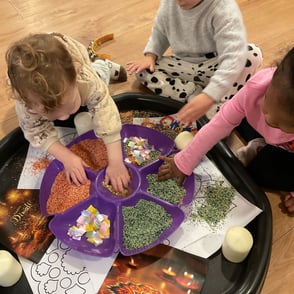Engaging Young Ears
In the bustling world of early childhood education, the importance of listening skills cannot be overstated. While reading, writing, and arithmetic often take center stage, listening is the unsung hero that underpins them all - it is our ability to listen, understand and then communicate that allows us all to work together and thrive. It is through listening that children learn to absorb new information, follow instructions, and engage with their peers (see our post on our work in music, song and its place in developing greater cognition and communicative capacities). As a nursery school that focuses on Multilingual Learning, we've always understood the cognitive benefits that language can have on developing minds. Our early bilingual programmes were geared towards language acquisition via the medium of music from the earliest stages, based on our passion for language and the knowledge and research that such programmes can have on cognitive development and the executive functioning of young children.
For nursery and preschool educators, the challenge is how to make listening both effective and entertaining. That's where listening games come into play—no pun intended! Let's dive into ten delightful listening games for early years that are sure to engage and entertain young ears.
The Importance of Listening Skills in Early Education
Before we jump into the games, let's take a moment to understand why listening skills are crucial in early education. Listening goes beyond simply hearing words; it involves processing and understanding information. When children develop strong listening skills, they are better equipped to focus, pay attention, and communicate effectively. These foundational skills set the stage for future academic success and enriched social interactions. In other words, listening is not just about the ears—it's about engaging the brain and the heart.
1. Simon Says
Let's start with a classic that never goes out of style: Simon Says. This game is a staple in many classrooms for a reason. It encourages children to follow instructions carefully and distinguish between what Simon says and what they think they heard. Keep it lively by throwing in funny or unexpected commands like "Simon says hop like a frog!" This game is not only fun but also hones children's focus and listening skills.
2. Sound Safari
Prepare children for an auditory adventure with Sound Safari. Collect a variety of sound-making objects—such as bells, shakers, and drums—and hide them around the room. As you play each sound, challenge the children to identify and locate the source. This game sharpens their auditory discrimination skills and introduces them to the concept of sound localization. It's particularly effective in developing focus and attention in young learners.
3. Musical Statues
A lively twist on a traditional favourite, Musical Statues blends movement with listening. Play lively music and encourage the children to dance or move around. When the music stops, they must freeze like statues. Not only does this game emphasise listening skills, but it also helps children practice self-control and coordination. Plus, it's a great way to burn off some energy! Check out the BBC Kids resource for this and other children's party games
4. Follow the Leader
Follow the Leader is another classic that exercises listening and observation skills. The designated "leader" performs actions, and the rest of the group must mimic them. Enhance the game by adding verbal instructions alongside the actions. This encourages children to listen carefully and follow directions accurately. You can introduce themes or fun scenarios to keep the game fresh and exciting.
5. Mystery Sound Box
Engage children's curiosity with the Mystery Sound Box. Fill a box with a variety of small, sound-producing objects—like coins, keys, or marbles. Shake the box and ask the children to guess what’s inside based on the sound. This game improves their auditory memory and encourages them to think critically about the sounds they hear. It's a simple yet effective way to enhance listening skills while sparking a sense of wonder.
6. Story Circle with a Twist
Gather the children in a circle for a storytelling session, but with a twist! As you read a story, pause occasionally and ask the children to predict what might happen next or to recall details you previously mentioned. This interactive storytelling approach keeps them engaged and attentive. It also encourages active listening and comprehension, critical components of early literacy.
7. Environmental Sound Hunt
Take the learning outdoors with an Environmental Sound Hunt. Equip each child with a checklist of natural sounds to find—such as birds chirping, leaves rustling, or water flowing. As they explore, encourage them to listen carefully and check off each sound they hear. This game not only enhances listening skills but also fosters an appreciation for nature and the world around them.
8. Whisper Down the Lane
Also known as Telephone, Whisper Down the Lane is a delightful game that emphasizes clear communication and active listening. Start with a simple message whispered to the first child, who then whispers it to the next, and so on. By the time the message reaches the last child, it’s often hilariously distorted. This game is a fun way to illustrate the importance of precise listening and communication.
9. Sound Bingo
Sound Bingo is a creative twist on the traditional bingo game. Prepare cards with images representing various sounds—like a barking dog, a ringing phone, or a thunderstorm. Play the corresponding sounds, and have the children mark off the images as they hear them. This game sharpens their ability to identify and differentiate sounds, making it both entertaining and educational.
10. Everyday Sound Scavenger Hunt
Transform everyday routines into a learning opportunity with an Everyday Sound Scavenger Hunt. Create a list of common household or classroom sounds, such as a clock ticking, a door closing, or a pencil tapping. As the children go about their day, challenge them to listen for these sounds and mark them off the list. This game cultivates attentive listening and an awareness of the auditory world around them.
11. Animal Sound Safari
Take children on an imaginary safari where they identify animal sounds. Use a device to play sounds like lions roaring, birds chirping, or frogs croaking. Encourage kids to guess the animal and describe what they hear. This is one of the most effective attention and listening games for children, as it combines imagination with auditory focus. Such listening skills games can enhance a child’s ability to distinguish sounds, fostering better listening skills in early years. It's perfect for listening games for preschoolers and encourages group participation while keeping learning fun and interactive.
12. Clap and Copy
Clap a rhythmic pattern and have children replicate it. Start with simple sequences and gradually increase complexity. This game is a classic among listening games for preschoolers and enhances auditory memory. It’s a great example of attention and listening games for early years, as it demands focus and quick response. By tuning into the rhythm, children develop better coordination and auditory retention, making it one of the most effective listening skills games for young learners.
13. Sound Treasure Hunt
Hide objects that make unique sounds, like a bell or a shaker, around the room. Guide children to find them by listening carefully as you give sound-based clues. This engaging activity is a wonderful addition to hearing games for children, promoting active listening and problem-solving. As an interactive option for listening games for preschoolers, it encourages teamwork and attentiveness, laying the foundation for strong listening skills early years while keeping the activity playful and exciting.
14. Story Sound Effects
Read a story and add sound effects like clapping for thunder or tapping for rain. Encourage children to create their own sound effects as the story progresses. This activity blends creativity with listening activities for kids, making it one of the most entertaining EYFS listening games. It develops their ability to connect sounds with actions or emotions, fostering better comprehension and auditory association. Such listening skills games are perfect for engaging children while teaching them the importance of listening attentively.
Hatching Dragons Dance, Music & Drama

 Hatching Dragons also employs specialist teachers in dance, music and drama - our friends at Lucy Sparkles - to really drive home the music mission. Interactive story telling, drama and music games like those listed above are the mainstay of the team at Sparkles, with their energy and passion for all things confidence building and communicative. They, like us, are passionate believers that we can really build confident communicators when we harness a child's innate sense of fun and self-expression and channel it into performance and dance. Come book a visit at one of our schools to see the programme for yourself!
Hatching Dragons also employs specialist teachers in dance, music and drama - our friends at Lucy Sparkles - to really drive home the music mission. Interactive story telling, drama and music games like those listed above are the mainstay of the team at Sparkles, with their energy and passion for all things confidence building and communicative. They, like us, are passionate believers that we can really build confident communicators when we harness a child's innate sense of fun and self-expression and channel it into performance and dance. Come book a visit at one of our schools to see the programme for yourself!
Hatching Dragons Music & Song
At Hatching Dragons, our music programme is designed to be a dynamic and enriching component of our curriculum, fostering creativity and cognitive development in young learners. We believe that music is a universal language that transcends cultural boundaries, and our programme is crafted to nurture this innate connection. Through engaging activities such as singing, rhythm exercises, and instrument exploration, children are encouraged to express themselves and develop their auditory skills. Our compassionate educators support each child's musical journey, ensuring that they feel confident and inspired to explore the world of sound. By integrating music into our daily routine, we aim to cultivate a lifelong appreciation for the arts, enhancing both emotional intelligence and cultural awareness. Why not check out our own proprietary bilingual song books to see how serious we take the art of song (and our regionally inspired music programmes below)
Conclusion
Incorporating listening games into early years education can be a game-changer—literally! These activities not only enhance children's listening skills but also promote focus, attention, and communication abilities. By infusing fun and creativity into learning, educators can foster an engaging and supportive environment where young learners thrive.
Remember, while listening games for early years are incredibly beneficial, they are just one piece of the puzzle. Blend these games with other sensory and motor activities to create a well-rounded educational experience. So, nursery and preschool educators, are you ready to engage those young ears? With these ten listening games in your toolkit, you're well-equipped to nurture the next generation of attentive listeners and enthusiastic learners.
Tags:
Parenting Tips
31-Dec-2024 12:00:17
Related Articles




Write a Comment